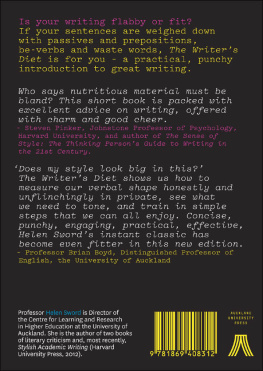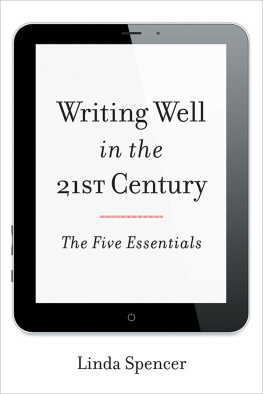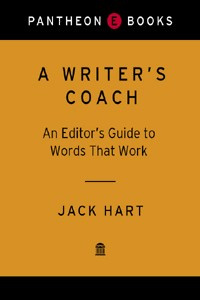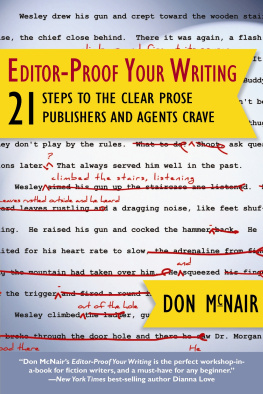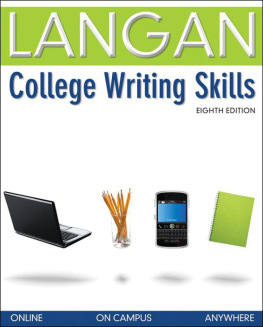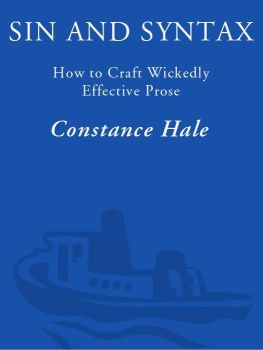Who says nutritious material must be bland? This short book is packed with excellent advice on writing, offered with charm and good cheer. Steven Pinker, Johnstone Professor of Psychology, Harvard University, and author of The Sense of Style: The Thinking Persons Guide to Writing in the 21st Century.
Does my style look big in this? The Writers Diet shows us how to measure our verbal shape honestly and unflinchingly in private, see what we need to tone, and train in simple steps that we can all enjoy. Concise, punchy, engaging, practical, effective, Helen Swords instant classic has become even fitter in this new edition. Professor Brian Boyd, the University of Auckland

Helen Sword is a Professor and Director of the Centre for Learning and Research in Higher Education at the University of Auckland. Trained as a literary scholar, she earned her PhD in Comparative Literature from Princeton University and taught for ten years in the English Department at Indiana University before taking up a lectureship in academic development at the University of Auckland in 2004. She has published widely on modernist literature, digital poetics, higher education pedagogy and academic writing, including five books Engendering Inspiration (Michigan, 1995), Ghostwriting Modernism (Cornell, 2002), The Writers Diet (first edition 2007), the co-edited volume Pacific Rim Modernisms (Toronto, 2009) and Stylish Academic Writing (Harvard, 2012) and numerous scholarly articles and commentaries. In 2007 she was a co-recipient of the University of Auckland Teaching Excellence Award for Innovation in Teaching, and in 2013 she received the HERDSA-TERNZ Research Medal, awarded each year by the Higher Education Research and Development Society of Australasia. Swords TED-Ed talk on zombie nouns has become a sleeper hit on YouTube, and she regularly offers workshops and seminars on stylish academic writing at universities around the world.
The Writers Diet
Helen Sword
ACKNOWLEDGEMENTS
We expect a dieting guru to be svelte, a personal trainer to sport strong muscles and the author of a book called The Writers Diet to produce flawless prose. In anticipation of robust critique from literary stylists, linguists and grammarians, I invited a number of people to read early drafts of this book and to cast stones both large and small. I thank these generous friends and colleagues by name in the first edition, and I renew my gratitude here.
My writing remains a glass house, of course; but I no longer fear shattered windows. Since its first publication in 2007, readers have embraced The Writers Diet. Some, predictably, have attacked the diet/edit analogy and questioned my fitness algorithms. Most, however, have responded exactly as I hoped they would: with a sense of humour and a grain of salt. A full list of the many people who have sent me helpful feedback about the book and website would fill several pages. I thank them all warmly.
Special thanks to Rachel Booth for early inspiration; to Lois Van Waardenburg for enduring wisdom; to Bronwen Nicholson at Pearson Education New Zealand for her act of faith in publishing the first edition; to Sam Elworthy, Anna Hodge, Katrina Duncan and the whole team at Auckland University Press for guiding this new version into print; to John Hamer for bringing the WritersDiet Test to life online; and to Richard, Claire, Peter and David yes, and Lyra too for keeping me fit and well-nourished in all the ways that matter most.
INTRODUCTION: THE WRITERS DIET
Imagine yourself recruiting a long-distance runner to deliver an important message. What kind of person will you choose: a lean, strong athlete with well-toned muscles and powerful lungs, or a podgy, unfit couch potato who will wheeze and pant up the first few hills before collapsing in exhaustion? The answer is obvious. Yet far too many writers send their best ideas out into the world on brittle-boned sentences weighted down with rhetorical flab.
This book will help you energise your writing, boost your verbal fitness and strip unnecessary padding from your prose. But whereas a successful exercise regime typically requires weeks or months of sustained effort before you see tangible results, here you will learn how to strengthen and tone your sentences with the stroke of a pen or the click of a mouse. The rules are deceptively simple: use active verbs whenever possible; favour concrete language over vague abstractions; avoid long strings of prepositional phrases; employ adjectives and adverbs only when they contribute something new to the meaning of a sentence; and finally, reduce your dependence on four pernicious waste words: it, this, that and there.
As with any fitness routine, adhering to these five principles requires energy and vigilance. The results, however, will speak for themselves. Your sentences will become sturdier and more energetic, and your ideas will fit more comfortably on your newly shapely prose.
Who needs the Writers Diet?
Whether you are a student, an academic, a journalist, a fiction writer or even a poet, this book will help you develop healthy writing habits and see your own words with new eyes. Each chapter takes you on a guided tour of some of the worlds finest sentences and some truly dreadful ones as well. Along the way, you will learn how to pep up your prose without losing your sense of style.
Crucially, The Writers Diet does not target beginning writers only. All too often, the most intellectually sophisticated authors are the ones who produce the most ungainly prose. Those who go on to pursue advanced academic degrees quickly learn the power of jargon, which functions within many professional spheres like a secret handshake among initiates. Over time, even the most experienced authors may lose their sense of perspective and come to regard impenetrable prose as normal. This book furnishes a reality check, a way for you to measure your own writing against the best and worst by your colleagues.
The Writers Diet provides no big picture advice on argument or audience, no instruction on composition or paragraph structure, no primer on correct grammar and punctuation. Instead, the book zeroes in on five common problems that frequently plague unfit sentences and offers practical exercises to help you develop healthier writing habits.
The WritersDiet Test
The five chapters of this book correspond to the five sections of the WritersDiet Test, a tongue-in-cheek diagnostic instrument that tells you whether your writing is flabby or fit. You can take the test online at www.writersdiet.com or follow the manual instructions at the back of the book.
Some writers use the WritersDiet Test to pinpoint problems in specific passages; others submit longer samples and try to identify overall patterns in their work. Either way, the test offers a heuristic, not a rigid formula or set of rules. Ask yourself: Did I write this way on purpose? Do I like the results?
The WritersDiet Test will help you identify signature patterns in your work: a weakness for be-verbs, perhaps, or a penchant for prepositional phrases. Maybe you will even spot some verbal tics not highlighted by the test itself. Many writers find that their scores change significantly depending on what kind of sample they test: a personal essay, for example, typically contains more concrete nouns and active verbs than an academic journal abstract, which is likely to be, well, more abstract.
Next page
